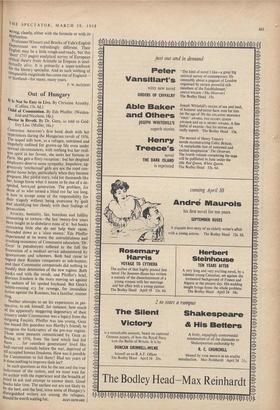Out of Hungary CHRISTINE ARNOTHY'S first book dealt with her
experiences during the Hungarian revolt of 1956. The sequel tells how, as a refugee, untrained and singularly unfitted for grown-up life even under normal circumstances, with nothing but her resil- ient spirit in her favour, she seeks her fortune in Paris. She gets a flinty reception : but her despised employers deserve some sympathy. Impulsive, ag- gressively 'intellectual' girls are not the most con- genial home helps, particularly when they become pregnant. Her pitiful story, told for thousands like her, brings home what it means to be one of a de- spoiled, betrayed generation. The problem, for those of us who turned a blind eye far too long, is how to accept some of the responsibility for their tragedy without being overcome by guilt and identifying too closely with their feelings of persecution.
Atrocity, bestiality, lies, boredom and futility amounting to torture—the last twenty-five years have taught us to disbelieve none of it : but books containing little else do not help their cause. Hounded down as a 'class enemy,' Ede Pfeiffer experienced at its worst the untruthfulness and crushing monotony of Communist education. 'Dr. Geza' (a pseudonym) suffered to the full the frustration of a medical service administered by ignoramuses and schemers. Both had cause to regard their Russian conquerors as sub-human; and their Communist compatriots did nothing to Modify their detestation of the new regime. Both books end with the revolt, and Pfeiffer's brief, glorious freedom is the more moving set against the sadness of his spoiled boyhood. But Geza's rabble-rousing cry for revenge, for immediate action against the Russians, has a familiar, sinister ring.
Neither attempts to set his experiences in per- spective, to ask himself, for instance, how much of the apparently staggering degeneracy of their country under Communism was a legacy from the outgoing Fascists. Pfeiffer was too young, Geza too biased (his guardian was Horthy's friend), to recognise the bankruptcy of the pre-war regime. Those same peasants romanticised by Geza as fleeing, in 1956, from 'the land which had fed them . . . for countless generations' lived like half-starved animals before the war, deprived of all accepted human freedoms. How was it possible for Communism to fail them? Had ten years of it done nothing to improve their lot?
In such questions as this lie the test and the true indictment of the system, and we must wait for an author with the experience and the breadth of mind to ask and attempt to answer them. Good books take time. The earliest out are not likely to be the best, and the best, since some of Hungary's distinguished writers are among the refugees,










































 Previous page
Previous page